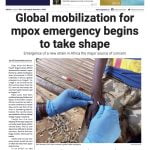The Bangladesh government has taken measures to reduce risk of spread of the coronavirus inside the Rohingya camps in the Cox’s Bazar.
“The goal is to reduce staff footprint of the operation, and to minimise risk within the camp setting while ensuring that some assistance and services are scaled up in light of the required COVID-19 response”, officials said.
The government temporarily closed shops, educational facilities, learning centres and training facilities. It has also suspended emergency shelter distribution, temporary shelter assistance, registration and verification process in the camps for 15 days.
Bangladesh has reported 39 infections and 5 deaths on Wednesday. However, experts warn that the million Rohingya refugees that live in crowded camps are vulnerable to infections.
Observers say that social distancing in the camps is nearly impossible. Most of the Rohingya have never heard about the disease as the government cut off most of their internet access in an effort to clamp down on the refugees.
Activists say that if the virus enters the crowds, it would be another massacre, much bigger than 2017, when some 740,000 Rohingyas were forced to flee Myanmar into camps in Bangladesh.
Bangladesh limits Rohingya camp activities amid COVID-19 concerns
EPA/NYUNT WIN
Rohingya children play during rain at an Internally Displaced Persons (IDPs) camp near Sittwe of Rakhine State, western Myanmar, 22 March 2016. According to media reports, the US State Department said on 21 March 2016 that Myanmar is persecuting its Rohingya Muslims, but not at the level of genocide.
- Advertisement -
- Advertisement -






